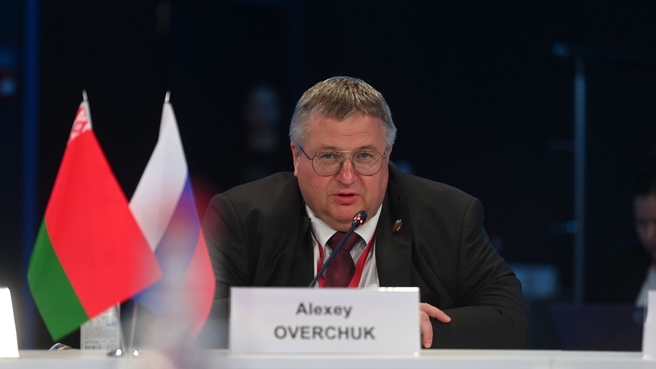Deputy Prime Minister Alexei Overchuk spoke at a session titled The Union State of Russia and Belarus: Strategy for Interaction at the 26th St Petersburg International Economic Forum.
Other participants included First Deputy Prime Minister of the Republic of Belarus Nikolai Snopkov, Ambassador Extraordinary and Plenipotentiary of the Republic of Belarus to the Russian Federation with the powers of Deputy Prime Minister of the Republic of Belarus Dmitry Krutoy, Secretary of State of the Union State Dmitry Mezentsev, business leaders and officials from ministries and agencies of Russia and Belarus.
Excerpts from the transcript:
Alexei Overchuk: Good afternoon, colleagues,
This forum’s motto – Sovereign Development as the Basis of a Just World: Joining Forces for Future Generations – accurately describes the main goal of building our union and the tasks that we, in conjunction with our Belarusian colleagues, are addressing in order to achieve it.
Amid global changes in the global economy, the restructuring of international trade and logistics processes, the building of Eurasian integration, that is, building strategic partnerships, primarily, with our closest neighbours, is playing a key role and is of particular importance.
Successfully overcoming the challenges faced by our countries, successfully embarking on the trajectory of sustainable sovereign growth and maintaining a stable situation not only in Russia and Belarus, but in other partner countries with which we form a single Eurasian region as well, depend on this work.
Today, we have three orbits of Eurasian integration: the Union State of Russia and Belarus, the Eurasian Economic Union and the Commonwealth of Independent States. Each of these associations has its own scope of duties, sometimes overlapping, its own decision-making procedure, and varying levels of depth of integration interaction.
The Union State enjoys the deepest level of integration. The Union State bore the brunt of the sanctions-related economic pressure on our countries last year. To some extent, this encouraged our countries to deepen cooperation.
Russian direct investment in the economy of Belarus over the past year increased more than 1.5-fold to $723 million (in 2022).
Mutual trade has grown to a record high of $43.4 billion. In and of itself, this figure has little to say, but it looks better in comparison. For example, if we take our foreign trade with China (about $185-$190 billion in 2022) and Belarus ($44 billion), then the importance of the Belarusian economy for Russia and the significance of these ties become clear.
Belarus has managed to maintain major industrial manufacturing facilities, and we are buying from the Belarusian producers final products with high added value. The high demand for Belarusian goods on our market can also be seen from the fact that in 2022 Belarus reported a trade surplus with Russia for non-energy goods. This is an important factor.
Regions play a special role in the relations between our two countries, and this work is being carried out on a wide scale, including at the level of our respective parliaments, with 64 Russian regions concluding over 2,300 contracts for a total of 63 billion roubles (since March 2022).
The implementation of 28 union programmes contributed to our stability to a large extent. These documents provide for a systematic transition to converging public administration and regulation in all key areas of our society.
Today, Union State programmes have been implemented by 80 percent. We are working, and the work is on schedule. We always emphasise that it is built in such a way that all of us are working in a single information space. As far as union programmes are concerned, horizontal ties have been established between our agencies, and the two governments are working as one.
Everything that is part of the union programmes is designed to facilitate Russian and Belarusian producers’ access to the markets of goods and services in the Union State. A process is underway that is designed to harmonise and unify legislation, reduce trade barriers, form common markets and conditions for the development of value-added chains based on industrial cooperation and levelling economic conditions for economic operators from our countries.
The Agreement on Uniform Competition Rules was signed and entered into force under a corresponding union programme. It laid down a uniform legal framework and principles for protecting competition to prevent monopolies, counter unfair practices, and ensure the free movement of goods, labour and services.
The financial sector and transport are converging as well. Integration is underway in industry and agriculture, that is, it directly benefits producers of goods from the Union State. We have achieved mutual understanding regarding uniform industrial policy. Lively discussions are underway to develop approaches to policies in the agro-industrial complex.
A basic agreement was signed on a common industrial policy and a framework agreement on the recognition of technological operations, which has the potential of manufacturing products that will be recognised as Union State-made products.
This effort is backed by a real budget, which stimulates interaction of Russian and Belarusian enterprises when it comes to implementing joint investment projects in the sphere of import substitution. It covers all key areas, including mechanical engineering, agricultural engineering, the automotive industry and electronics.
We are stepping up work as part of joint projects on import substitution within the framework of a loan issued to the Belarusian side. This work is underway and has been effective.
Institutional development is underway as part of the efforts to implement the Union State programmes. An integrated indirect tax administration system has been put into operation. The Treaty on General Principles of Levying Indirect Taxes was signed. The document defines our joint data transfer commitments as well as minimum tax rates. In addition, work on creating a supranational tax committee is underway. In the customs sphere, a body has been created that is jointly assessing customs risks. All of that is designed to have our respective economies operate as one.









